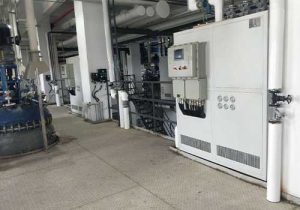a chiller
Understanding Chillers: The Heart of Temperature Control Systems
Chillers are essential equipment in numerous industrial and commercial applications, providing precise temperature control that is vital for process efficiency, product quality, and comfort. A chiller is a machine that removes heat from a liquid via a vapor-compression or absorption refrigeration cycle and is used in various applications, including air conditioning, industrial processes, and refrigeration.

How Chillers Work
Chillers operate on the principle of heat transfer. They circulate a refrigerant that absorbs heat from the process fluid or space being cooled. This heat absorption causes the refrigerant to evaporate, turning it into a gas. The gas is then compressed, which raises its temperature and pressure. The hot, high-pressure gas is cooled in a condenser, typically by either air or water, releasing the heat into the environment. The cooled refrigerant then returns to the evaporator as a liquid, where the cycle begins anew.
Types of Chillers
Chillers come in various types, each designed for specific applications:
Air-Cooled Chillers: These chillers use ambient air to dissipate heat, making them suitable for applications where water sources are limited or where the environment demands a simple and robust cooling solution.
Water-Cooled Chillers: These chillers use water as a cooling medium, offering high efficiency and a broad range of cooling capacities. They are particularly well-suited for indoor applications in chemical plants, manufacturing facilities, and medical facilities where precise temperature control is crucial.

Absorption Chillers: Operating using heat rather than electricity, absorption chillers are a sustainable choice for cooling systems. They utilize a refrigerant and absorbent pair, such as water and lithium bromide, to cool spaces or industrial processes.
Applications of Chillers
Chillers are used across various sectors, including:
Air Conditioning: Chillers are used in large-scale commercial buildings, such as offices, malls, and hotels, to maintain comfortable indoor temperatures.
Industrial Processes: In manufacturing, chillers are used for cooling molds in plastic injection molding, maintaining stable temperatures in chemical reactions, and preserving the integrity of sensitive electronic components.
Food and Beverage Industry: Chillers are key in chilling processes where precision, reliability, and efficiency are paramount, such as in breweries, dairies, and food processing plants.
Pharmaceutical and Medical Sectors: Chillers are used to maintain precise temperature control in laboratories, storage facilities for temperature-sensitive medications, and in medical imaging equipment like MRI machines.
Maintenance and Efficiency Considerations

Regular maintenance is essential for the reliable operation of chillers. This includes inspections of the condenser and evaporator coils, checking the refrigerant levels, and ensuring that the compressor and motor are functioning correctly. Energy-efficient chillers contribute to sustainability goals by consuming less electricity and reducing greenhouse gas emissions.
Innovations and Market Trends
The market for chillers is driven by the demand for intelligent and energy-efficient systems with a low environmental impact. Innovations in the field focus on energy efficiency, environmentally friendly technologies, and advanced controls for improved performance. For instance, the introduction of variable-speed drives, which adjust the compressor speed based on the cooling load, has significantly improved the energy efficiency of chillers. Additionally, the development of chillers using natural refrigerants, such as ammonia or carbon dioxide, is shaping the future of cooling technology by reducing the environmental impact of these systems.
Conclusion
Chillers are indispensable in maintaining the optimal temperature conditions necessary for efficient and effective operations across various industries. With continuous innovations in technology and a growing focus on sustainability, these systems are becoming more efficient and environmentally friendly. Regular maintenance and staying informed about the latest advancements will ensure that chillers continue to provide effective cooling for years to come.
Related recommendations
Low Temperature Chiller for UV Curing Equipment
1681Low Temperature Chiller for UV Curing Equipment UV curing machine equipment is widely used in printing, coating, electronics, medical and other industries. Its function is to cure materials ...
View detailschilled water circulation system
235IntroductionA chilled water circulation system is an integral component of central cooling systems, widely utilized in commercial buildings, industrial facilities, and large - scale residential c...
View detailsHow to Choose a Suitable Refrigerant for Low Temperature Chiller?
1675How to Choose a Suitable Refrigerant for Low Temperature Chiller? The nature of the refrigerant will directly affect the type, structure, size and operating characteristics of the chiller, an...
View detailsParameters and Requirements of Chiller Selection
1312Parameters and Requirements of Chiller Selection In industrial production, the equipment will generate heat during operation. If the heat cannot be dissipated in time, it will affect the nor...
View details
 LNEYA Chiller
LNEYA Chiller







HelloPlease log in